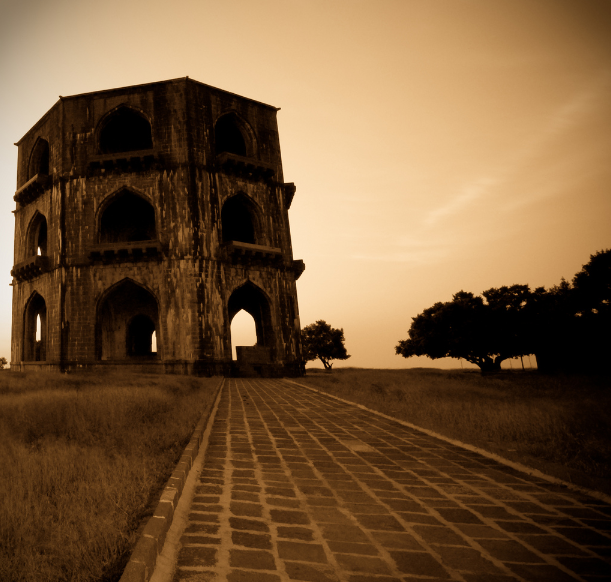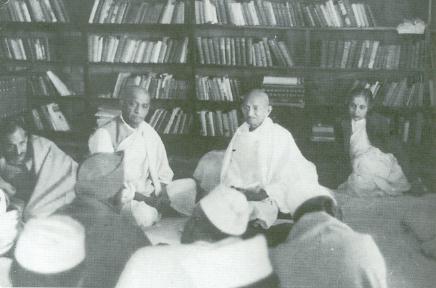|
Pattabhi Sitaramayya
Bhogaraju Pattabhi Sitaramayya (24 November 1880 – 17 December 1959) was an Indian independence activist and political leader in the state of Andhra Pradesh. He was also the first governor (1 November 1956 – 13 June 1957) of Madhya Pradesh. Early life and education Born in Gundugolanu village, Krishna district (now part of Eluru district) in Andhra Pradesh to a Telugu Niyogi Brahmin family, Pattabhi graduated from the Madras Christian College, fulfilled his ambition to become a medical practitioner by securing a M.B.C.M. degree. Career Medical and early political career He started his practice as a doctor in the coastal town of Machilipatnam, headquarters of Krishna District and the political centre of Andhra. He left his lucrative practice to join the freedom fighting movement. During the years 1912–13, when there was a great controversy over the desirability of forming a separate province for Andhra, he wrote a number of articles in "The Hindu" and other journals expla ... [...More Info...] [...Related Items...] OR: [Wikipedia] [Google] [Baidu] |
President Of The Indian National Congress
The President of the Indian National Congress is the chief executive of the Indian National Congress (INC), one of the principal political parties in India. Constitutionally, the president is elected by an electoral college composed of members drawn from the Pradesh Congress Committees and members of the All India Congress Committee (AICC). In the event of any emergency because of any cause such as the death or resignation of the president elected as above, the most senior General Secretary discharges the routine functions of the president until the Working Committee appoints a provisional president pending the election of a regular president by the AICC. The president of the party has effectively been the party's national leader, head of the party's organisation, head of the Working Committee, the chief spokesman, and all chief Congress committees. After the party's foundation in December 1885, Wyomesh Chandra Banerjee became its first president. From 1885 to 1933, the preside ... [...More Info...] [...Related Items...] OR: [Wikipedia] [Google] [Baidu] |
Ravishankar Shukla
Ravishankar Shukla (2 August 1877 — 31 December 1956) was a leader of the Indian National Congress, Indian independence movement activist, the Premier of the Central Provinces and Berar from 27 April 1946 to 25 January 1950, first Chief Minister of the reorganised Madhya Pradesh state from 1 November 1956 until his death on 31 December 1956, he was elected from Saraipali, Madhya Pradesh now part of the state of Chhattisgarh. He also served as Member of Constituent Assembly of India from Central Provinces and Berar. Early life Pandit Ravi Shankar Shukla was born to Pandit Jagganath Shukla (1854–1924) and Tulsi Devi (1856–1941) on 2 August 1877, at Sagar in the Central Provinces of British India. Born into a wealthy Saryupareen Brahmin family, his father and grandfather were rich and scholarly. His father, Pandit Jagganath Shukla, came of a family which had resisted British rulers for three generations and his mother, Tulsi Devi, was industrious and a capable manager. Yo ... [...More Info...] [...Related Items...] OR: [Wikipedia] [Google] [Baidu] |
Niyogi
Niyogi Brahmin is a Telugu Brahmin subcaste native to the Indian States of Andhra Pradesh and Telangana, but are spread throughout South India and Maharashtra. The traditional occupations of the Niyogi Brahmins are settled cultivation and priest hood. But majority of them took up various secular vocations including military activities and patwaris. They were associated with administration, economics, literature, music composing, politics, scholarly, scientific, engineering, defense and warfare careers. Etymology The word ''Niyogi'' is derived from Yoga, which in this context means "religious contemplation", as opposed to Yaga, which means "religious sacrifice". ''Niyogin'' in Sanskrit also means "employed", "appointed" or "assigned" and it is probable that Niyogis were given this name because they accept secular employment.Hopkins, Religions of India, p. 192 states: "As to the fees, the rules are precise, and the propounders of them are unblushing." See also * Telugu B ... [...More Info...] [...Related Items...] OR: [Wikipedia] [Google] [Baidu] |
Ahmednagar
Ahmednagar (), is a city located in the Ahmednagar district in the state of Maharashtra, India, about 120 km northeast of Pune and 114 km from Aurangabad. Ahmednagar takes its name from Ahmad Nizam Shah I, who founded the town in 1494 on the site of a battlefield where he won a battle against superior Bahamani forces. It was close to the site of the village of Bhingar. With the breakup of the Bahmani Sultanate, Ahmad established a new sultanate in Ahmednagar, also known as Nizam Shahi dynasty. Ahmednagar has several dozen buildings and sites from the Nizam Shahi period. Ahmednagar Fort, once considered almost impregnable, was used by the British to house Jawaharlal Nehru (the first prime minister of India) and other Indian Nationalists before Indian independence. A few rooms there have been converted to a museum. During his confinement by the British at Ahmednagar Fort in 1944, Nehru wrote the famous book ''The Discovery of India''. Ahmednagar is home to the Indian A ... [...More Info...] [...Related Items...] OR: [Wikipedia] [Google] [Baidu] |
Quit India Movement
The Quit India Movement, also known as the August Kranti Movement, was a movement launched at the Bombay session of the All India Congress Committee by Mahatma Gandhi on 8th August 1942, during World War II, demanding an end to British rule in India. After the failure of the Cripps Mission to secure Indian support for the British war effort, Gandhi made a call to ''Do or Die'' in his Quit India movement delivered in Bombay on 8 August 1942 at the Gowalia Tank Maidan. The All India Congress Committee launched a mass protest demanding what Gandhi called "An Orderly British Withdrawal" from India. Even though it was at war, the British were prepared to act. Almost the entire leadership of the Indian National Congress was imprisoned without trial within hours of Gandhi's speech. Most spent the rest of the war in prison and out of contact with the masses. The British had the support of the Viceroy's Council, of the All India Muslim League, the Hindu Mahasabha, the princely state ... [...More Info...] [...Related Items...] OR: [Wikipedia] [Google] [Baidu] |
Congress Working Committee
The Congress Working Committee (CWC) is the executive committee of the Indian National Congress. It was formed in December 1920 at Nagpur session of INC which was headed by C. Vijayaraghavachariar. It typically consists of fifteen members elected from the All India Congress Committee. It is headed by the Working President. The Working Committee has had different levels of power in the party at different times. In the period prior to Indian independence in 1947, the Working Committee was the centre of power, and the Working President was frequently more active than the Congress President. In the period after 1967, when the Congress Party split for the first time (between factions loyal to Indira Gandhi and those led by the Syndicate of regional leaders including Kamaraj, Prafulla Chandra Sen, Ajoy Mukherjee, and Morarji Desai), the power of the Working Committee declined; but Indira Gandhi's triumph in 1971 led to a re-centralisation of power away from the states and the All-Ind ... [...More Info...] [...Related Items...] OR: [Wikipedia] [Google] [Baidu] |
Telugu People
Telugu people ( te, తెలుగువారు, Teluguvāru), or Telugus, or Telugu vaaru, are the largest of the four major Dravidian ethnolinguistic groups in terms of population. Telugus are native to the Indian states of Andhra Pradesh, Telangana and the Yanam district of Puducherry. A significant number of Telugus also reside in the surrounding Indian states of Karnataka, Tamil Nadu, Maharashtra, Gujarat, West Bengal, Chhattisgarh, Kerala, and Odisha, as well in the union territory of Andaman and Nicobar Islands. Telugus claim descent from the Andhras, from whom the Telugus inherit their ethnonym. Telugu is the fourth most spoken language in India and the 15th most spoken language in the world. Andhra was mentioned in the Sanskrit epics such as Aitareya Brahmana (by some estimates c. 800 BCE). According to Aitareya Brahmana of the Rigveda, the Andhras left North India from the banks of river Yamuna and migrated to South India. They are mentioned at the time of the d ... [...More Info...] [...Related Items...] OR: [Wikipedia] [Google] [Baidu] |
Tamil People
The Tamil people, also known as Tamilar ( ta, தமிழர், Tamiḻar, translit-std=ISO, in the singular or ta, தமிழர்கள், Tamiḻarkaḷ, translit-std=ISO, label=none, in the plural), or simply Tamils (), are a Dravidian peoples, Dravidian ethno-linguistic group who trace their ancestry mainly to India’s South India, southern state of Tamil Nadu, union territory of Puducherry (union territory), Puducherry and to Sri Lanka. Tamils who speak the Tamil Language and are born in :Social groups of Tamil Nadu, Tamil clans are considered Tamilians. Tamils constitute 5.9% of the population in India (concentrated mainly in Tamil Nadu and Puducherry), 15% in Sri Lanka (excluding Sri Lankan Moors), 7% in Tamil Malaysians, Malaysia, 6% in Tamil Mauritians, Mauritius, and 5% in Indian Singaporeans, Singapore. From the 4th century BCE, urbanisation and mercantile activity along the western and eastern coasts of what is today Kerala and Tamil Nadu led to the develo ... [...More Info...] [...Related Items...] OR: [Wikipedia] [Google] [Baidu] |
Netaji
Subhas Chandra Bose ( ; 23 January 1897 – 18 August 1945 * * * * * * * * *) was an Indian nationalist whose defiance of British authority in India made him a hero among Indians, but his wartime alliances with Nazi Germany and Imperial Japan left a legacy vexed by authoritarianism,* * anti-Semitism,* * * * * * and military failure.* * * * The honorific Netaji (Hindi: "Respected Leader") was first applied to Bose in Germany in early 1942—by the Indian soldiers of the ''Indische Legion'' and by the German and Indian officials in the Special Bureau for India in Berlin. It is now used throughout India. Subhas Bose was born into wealth and privilege in a large Bengali family in Orissa during the British Raj. The early recipient of an Anglocentric education, he was sent after college to England to take the Indian Civil Service examination. He succeeded with distinction in the vital first exam but demurred at taking the routine final exam, citing nationalism to be a higher ... [...More Info...] [...Related Items...] OR: [Wikipedia] [Google] [Baidu] |






